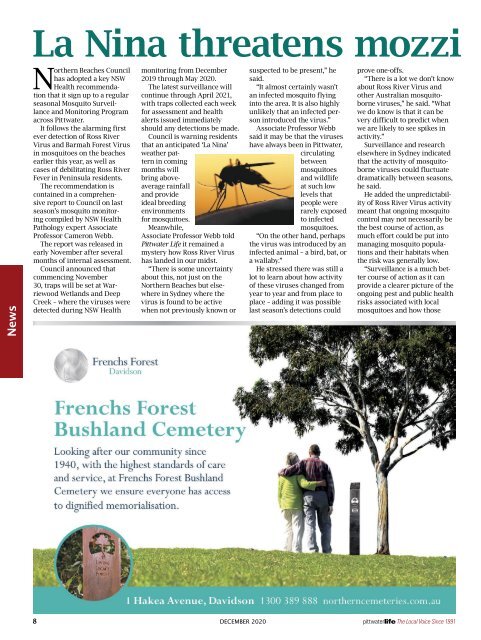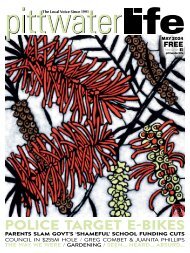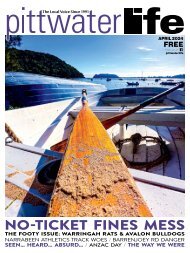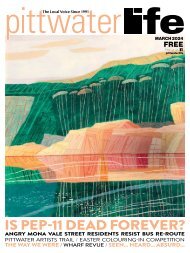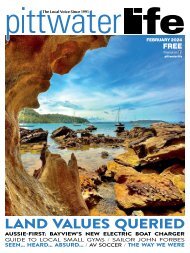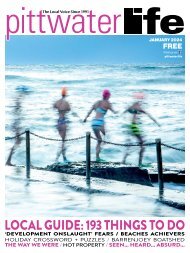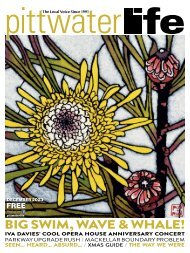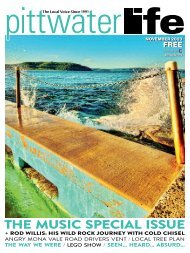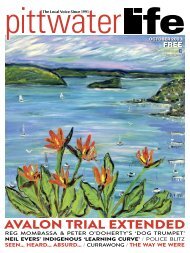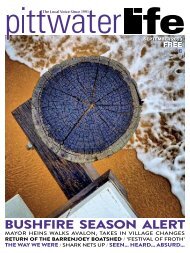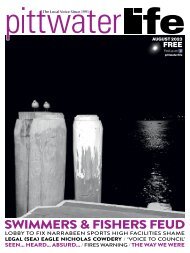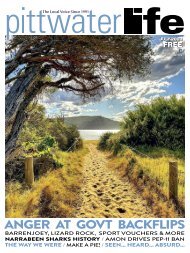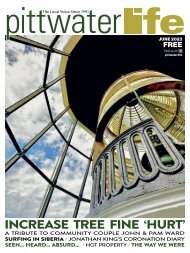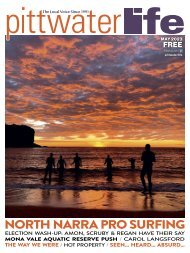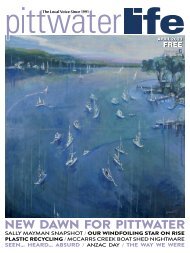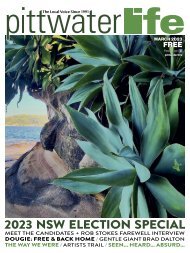Pittwater Life December 2020 Issue
COUNCIL DISMISSES MONEY ‘WOES’ GROUNDED AIRLINE PILOTS FINDING NEW DRIVE ON OUR ROADS A FLOOD OF CASH: BUT HOW WILL IT FIX THE WAKEHURST PARKWAY? SERPENTINE PROTEST / COVID SAFE XMAS / SEEN... HEARD... ABSURD...
COUNCIL DISMISSES MONEY ‘WOES’
GROUNDED AIRLINE PILOTS FINDING NEW DRIVE ON OUR ROADS
A FLOOD OF CASH: BUT HOW WILL IT FIX THE WAKEHURST PARKWAY?
SERPENTINE PROTEST / COVID SAFE XMAS / SEEN... HEARD... ABSURD...
- No tags were found...
Create successful ePaper yourself
Turn your PDF publications into a flip-book with our unique Google optimized e-Paper software.
La Nina threatens mozzi<br />
es en masse<br />
MONITORING:<br />
NSW Health will check<br />
traps at Warriewood<br />
Wetlands and Narrabeen<br />
Lagoon on a weekly basis.<br />
News<br />
Northern Beaches Council<br />
has adopted a key NSW<br />
Health recommendation<br />
that it sign up to a regular<br />
seasonal Mosquito Surveillance<br />
and Monitoring Program<br />
across <strong>Pittwater</strong>.<br />
It follows the alarming first<br />
ever detection of Ross River<br />
Virus and Barmah Forest Virus<br />
in mosquitoes on the beaches<br />
earlier this year, as well as<br />
cases of debilitating Ross River<br />
Fever in Peninsula residents.<br />
The recommendation is<br />
contained in a comprehensive<br />
report to Council on last<br />
season’s mosquito monitoring<br />
compiled by NSW Health<br />
Pathology expert Associate<br />
Professor Cameron Webb.<br />
The report was released in<br />
early November after several<br />
months of internal assessment.<br />
Council announced that<br />
commencing November<br />
30, traps will be set at Warriewood<br />
Wetlands and Deep<br />
Creek – where the viruses were<br />
detected during NSW Health<br />
monitoring from <strong>December</strong><br />
2019 through May <strong>2020</strong>.<br />
The latest surveillance will<br />
continue through April 2021,<br />
with traps collected each week<br />
for assessment and health<br />
alerts issued immediately<br />
should any detections be made.<br />
Council is warning residents<br />
that an anticipated ‘La Nina’<br />
weather pattern<br />
in coming<br />
months will<br />
bring aboveaverage<br />
rainfall<br />
and provide<br />
ideal breeding<br />
environments<br />
for mosquitoes.<br />
Meanwhile,<br />
Associate Professor Webb told<br />
<strong>Pittwater</strong> <strong>Life</strong> it remained a<br />
mystery how Ross River Virus<br />
has landed in our midst.<br />
“There is some uncertainty<br />
about this, not just on the<br />
Northern Beaches but elsewhere<br />
in Sydney where the<br />
virus is found to be active<br />
when not previously known or<br />
suspected to be present,” he<br />
said.<br />
“It almost certainly wasn’t<br />
an infected mosquito flying<br />
into the area. It is also highly<br />
unlikely that an infected person<br />
introduced the virus.”<br />
Associate Professor Webb<br />
said it may be that the viruses<br />
have always been in <strong>Pittwater</strong>,<br />
circulating<br />
between<br />
mosquitoes<br />
and wildlife<br />
at such low<br />
levels that<br />
people were<br />
rarely exposed<br />
to infected<br />
mosquitoes.<br />
“On the other hand, perhaps<br />
the virus was introduced by an<br />
infected animal – a bird, bat, or<br />
a wallaby.”<br />
He stressed there was still a<br />
lot to learn about how activity<br />
of these viruses changed from<br />
year to year and from place to<br />
place – adding it was possible<br />
last season’s detections could<br />
prove one-offs.<br />
“There is a lot we don’t know<br />
about Ross River Virus and<br />
other Australian mosquitoborne<br />
viruses,” he said. “What<br />
we do know is that it can be<br />
very difficult to predict when<br />
we are likely to see spikes in<br />
activity.”<br />
Surveillance and research<br />
elsewhere in Sydney indicated<br />
that the activity of mosquitoborne<br />
viruses could fluctuate<br />
dramatically between seasons,<br />
he said.<br />
He added the unpredictability<br />
of Ross River Virus activity<br />
meant that ongoing mosquito<br />
control may not necessarily be<br />
the best course of action, as<br />
much effort could be put into<br />
managing mosquito populations<br />
and their habitats when<br />
the risk was generally low.<br />
“Surveillance is a much better<br />
course of action as it can<br />
provide a clearer picture of the<br />
ongoing pest and public health<br />
risks associated with local<br />
mosquitoes and how those<br />
risks change with local conditions,”<br />
Associate Professor<br />
Webb said.<br />
He agreed the quantity and<br />
pattern of rainfall would be<br />
the most important factor in<br />
future years.<br />
“Even if similar quantities of<br />
rainfall are recorded in coming<br />
years, if that rainfall occurs in<br />
spring or late autumn, when<br />
weather is cooler, we may not<br />
see as substantial a rise in<br />
mosquito populations nor an<br />
elevated pest or public health<br />
threat,” he said.<br />
“For example, there has<br />
been a lot of rain in spring but,<br />
elsewhere in Sydney where<br />
surveillance was already underway<br />
in November, mosquito<br />
populations remained low due<br />
to relatively cooler weather.”<br />
Associate Professor Webb<br />
said any ‘La Nina’ weather pattern<br />
would provide an interesting<br />
situation.<br />
“In theory we may see more<br />
mosquitoes due to forecast<br />
increased rainfall but I’m reluctant<br />
to predict whether we’ll<br />
see such a large increase in<br />
mosquitoes,” he said.<br />
“It really depends on just<br />
how much rainfall occurs and<br />
over what period. The same<br />
amount of rain that falls as<br />
steady rainfall over the summer,<br />
versus a week of exceptional<br />
rainfall, can have very<br />
different impacts.<br />
“I think it is reasonable to<br />
conclude though that we’ll<br />
have average to above average<br />
mosquito activity with the<br />
expected rainfall.”<br />
Associate Professor Webb<br />
said he and colleagues at the<br />
University of Sydney were looking<br />
for clues in the genetics of<br />
the viruses “to see if that may<br />
identify pathways of introduction<br />
or insights to their history<br />
in the local area”.<br />
Mayor Michael Regan said<br />
Council is undertaking a<br />
public education program that<br />
will include an information<br />
hub on its website, advice and<br />
education to the community<br />
via social media and on-site<br />
signage.<br />
NSW Health advice on simple<br />
steps to avoid being bitten by<br />
mosquitoes include:<br />
Avoid being outside unprotected<br />
at dusk, when mosquitoes<br />
are commonly active and<br />
cover up as much as possible<br />
with light-coloured, loosefitting<br />
clothing and covered<br />
footwear.<br />
Apply mosquito repellent<br />
regularly to exposed areas.<br />
Don’t use repellents on the<br />
skin of children under the age<br />
of three months. Instead use<br />
physical barriers such as netting<br />
on prams, cots and play<br />
areas.<br />
Eradicate mosquito breeding<br />
sites around the home, including<br />
containers and that hold<br />
water.<br />
Use flyscreens on windows<br />
and doors of houses and keep<br />
them in good order.<br />
– Nigel Wall<br />
News<br />
8 DECEMBER <strong>2020</strong><br />
The Local Voice Since 1991<br />
The Local Voice Since 1991<br />
DECEMBER <strong>2020</strong> 9


